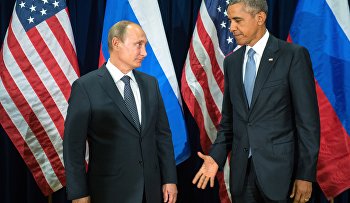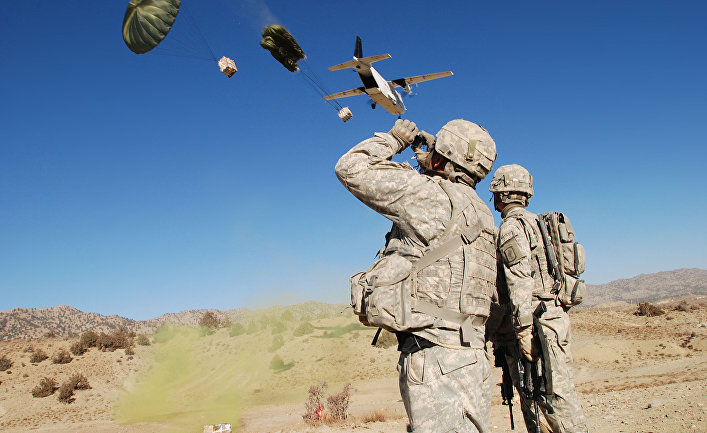The US-Russian stand-off in Syria grows steadily more aggressive. In retaliation for assaults by Syrian government troops under Russian air-strike support, Washington has actioned deliveries of anti-tank systems to the Syrian rebels to be supplied to the Syrian opposition forces via America's allies in the region. There is now a world discussion of a possible proxy war between Russia and the US in Syria. Experts questioned by the “Kommersant” said the flashpoint could be US provision of anti-aircraft weaponry to the Syrian rebels. However, considering the risks this would cause for the US's own security, this seems a step too far for the Americans at present.
Following the first days of the Syrian army offensive, directed towards the provinces of Latakia, Aleppo, and Homs, the western-backed Syrian armed opposition is now trying to grab the initiative, not only in the field, but also in the propaganda war. International media have shop-windowed statements by rebel commanders about the large quantities of Russian-made armored vehicles serving the Syrian army, and how these have been destroyed using American-made BGM-71 TOW anti-tank weaponry. Dozens of video clips have appeared on the Internet, showing Assad-loyal tanks in flames in the Hama and Idlib provinces.
A few Syria insurgent groups now getting US-made TOW missiles as fast as they can fire them. w/ @KaramShoumali http://t.co/VimHQT7w4D
— Anne Barnard (@ABarnardNYT) October 13, 2015
The running theme in most of these western news reports is the successful use of anti-tank systems in halting the advance of the Syrian army, which could alter the course of the stand-off. Washington has made it known that while pulling out of its $500-million-dollar program of training Syrian rebels, it has no plans to shut-down its program of arming the Syrian opposition groups with American weaponry, which commenced in 2013. The actual deliveries of these weapons are made by the US's allies in the region, but the decision to activate them was made by the Obama administration, the New York Times has stated.
Reports that Syrian rebels have deployed American-supplied weaponry against Russian military hardware in the hands of President Assad's forces have prompted extensive speculation regarding a so-called 'proxy war' between the USA and Russia in Syria. “This isn't a planned proxy war, but a coincidental one. It just happens that the rebels have a bunch of anti-missile systems, and the Syrian army is attacking those with Russian assistance” said Washington-based expert Jeff White of the Institute for Near East Policy, as cited in the New York Times.
Meanwhile, President Obama has already ruled out any option of a proxy war with Russia. During a White House Press Conference, the US President confirmed the future option of collaboration with Russian President Vladimir Putin on Syria. “We're ready to work with him — if he's ready to contribute to regime change by political means,” President Obama stated.
Syrian conflict won't turn into US/Russia proxy war, reaffirms White House http://t.co/DEBi9Ecsus
— Ruptly (@Ruptly) October 15, 2015
Experts with whom “Kommersant” has consulted on this issue believe differences of opinion about a proxy war arise from conflicting interpretations of what the term really implies. “In the broadest sense, a proxy war means conducting warfare via third parties – the kind of war which has been going on for a long time now in Syria. The USA insists on providing military support to armed opposition militias in Syria, while President Assad's forces are receiving Russian weapons,” said Andrei Kortunov, Director of the Russian Council for Foreign Affairs. “But you can similarly say that Russian and American weapons are being used in many different conflicts all over the world. I'd say that using describing the Syrian conflict as a full-scale proxy war is misleading.”
Meanwhile Russian experts guard against the conclusion that commencing the supply of US anti-tank hardware to the Syrian opposition would automatically give the rebels the upper hand. Ruslan Pukhov – Director of the Centre for Analysis of Strategy and Technology – maintains the watershed would be provision of US man-portable air-defense systems (MANPADS) – and that this would be the step that would signal a true proxy war between Russia and the USA in Syria. “The Obama administration knows very well that supplying that kind of weaponry would not only be interpreted by Moscow as a major affront to Russia, and to President Putin in person, but it would also put the slips under American security, if those MANPADS turned-up later in the hands of America's enemies,”Ruslan Pukhov explained.
US air-drops weapons to militants fighting in Syria: Pentagon Read: http://t.co/xF7s86s5Pm pic.twitter.com/lxCS0ZiGjt
— Press TV (@PressTV) October 12, 2015
Retired Colonel Oleg Kulakov, a lecturer at the Military University, is in full agreement with Ruslan Pukhov. “Anti-tank systems were supplied to the Syrian opposition before, and really the rebels ought to find they've already got plenty of them. But when it comes to anti-aircraft systems, President Obama's got lots of reasons to sit on the fence. The first is that there's no guarantee whatsoever that this weaponry wouldn't later be used against the USA or its NATO allies. The Americans still have bitter memories of supplying 'Stinger' missiles to the Afghan mujahadeen, and then having to buy them back again for a higher price. The second reason is that if such supplies went ahead, it would give Moscow the green light for supplying Damascus with S-300 hardware, which we've so far held back on doing. And then thirdly, before taking the decision, the US will need to think long and hard about the interests other nations have in this issue, such as Israel and Turkey. They have historic interests in preventing the escalation of such weaponry in the region,” Colonel Kulakov said to “Kommersant.”

During its discussions with both the Americans and their European counterparts, Russia has persistently brought home the dangers of supplying weapons to the opponents of the Damascus regime. This was made clear to “Kommersant” by Maria Zakharova, Director of Press and Information at the Russian Foreign Ministry. “We've made one thing very clear to them. If you supply arms to those you term the more moderate opposition, you haven't the slightest guarantee that either the weapons, or the people you gave them to, won't end-up on the side of a terrorist organization. There's no certainty whatsoever that the MANPADS being talked about in the Western press won't fall into the hands of entirely different recipients,” Zakharova said.






